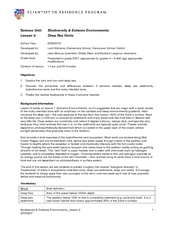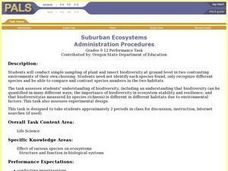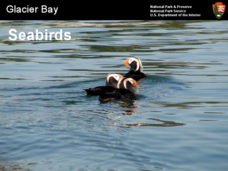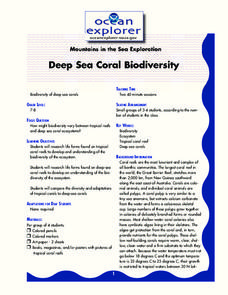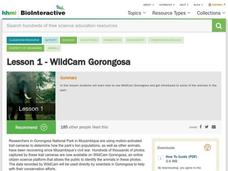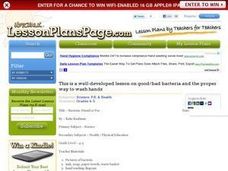It's About Time
Who Eats Whom?
Packed with visual aids and multiple learning opportunities, an engaging exercise challenges individuals as they explore the role of producers, consumers, and decomposers. After discussing differences between food chains, food...
Curated OER
Deep Sea Vents
Students study the vent and non vent deep sea and see the differences in habitats. In this investigative lesson plan students complete a worksheet and work in groups.
Curated OER
Suburban Ecosystems
Learners conduct simple sampling of plant and insect biodiversity at ground level in two contrasting environments of their own choosing. They recognize and record different species then compare and contrast species numbers in the two...
Curated OER
Biodiversity Trust Games
Students make a tight shoulder-to-shoulder circle. They are asked to turn to his or her right. Students squeeze in tight, they are explained that on the count of three, everyone slowly sits down. Once they are successfully seated,...
NOAA
What Little Herc Saw
See the underwater world through a different pair of eyes! Middle school marine biologists identify deep-sea organisms by examining images taken by an ROV from the Okeanos Explorer. After determining what creatures lie beneath the...
Howard Hughes Medical Institute
Gorongosa: Making Observations Activity
Do you have young scientists wanting to make new discoveries rather than just completing the same experiments? Young scientists use their observational skills to identify animals and patterns in animal behavior. Through tracking...
Curated OER
Glacier Bay Seabirds
A gorgeous collection of photographs take viewers on a virtual tour or Glacier Bay National Park with a focus on the seabirds living in the area. Adaptations to the polar climate are highlighted, different species of birds are displayed,...
American Museum of Natural History
What's This? Feeding
Some species have pretty creative methods for catching food. Young scientists learn about some interesting ways organisms get the nutrients they need by navigating an online interactive lesson that would be suitable for a remote learning...
Howard Hughes Medical Institute
Lesson 2: Gorongosa National Park
How has Gorongosa National Park changed over time? Discover the park's rich history, dating back to primitive human times, through an interactive timeline and scientific reading. The second installment in an eight-part series explores...
Curated OER
Non Native Species: English Ivy-Landscape Plant or Deadly Killer?
Students examine an area overrun by English Ivy. They explore how invasive species affect an ecosystem. They also study about the lack of biodiversity and how to measure it out in the field.
Curated OER
Sea Connections: Marine Ecosystems
Students identify producers and consumers from marine ecosystems and describe the balance among them in the environments. After constructing a food chain from a marine ecosystem, they examine human activities that can upset the balance...
Curated OER
Norman Suburban Activity
Students analyze the factors affecting organisms in the pond ecosystem. In this environmental science activity, students perform an experiment to determine pH, nutrients and temperature of different pond sites. They present their result...
Curated OER
Understanding Interactions Among Local Species and the Local Environment
Students examine the differences between biotic and abiotic factors, explain the difference between habitat and niche and compare how organisms get their nutritional needs. In this local environment lesson students trace the path...
Curated OER
The Dam Builders
Students examine biodiversity issues. In this European beaver lesson, students visit selected websites to discover information about the reintroduction of the species in Britain. Students complete the included biodiversity...
Curated OER
Preserving Paradise
Students read an online article to study about the death of Joan Root. They research endangered ecosystems around the world and design ad campaigns to create public awareness.
Curated OER
Sea Connections
Students, after locating different marine habitats on a globe, play a card game about ecosystems, food webs and organisms.
Curated OER
Deep Sea Coral Biodiversity
Students research life forms on tropical coral reefs in order to explore the biodiversity of the ecosystem. In this biodiversity instructional activity students work in groups and complete their coral reef activity.
University of Connecticut
Building Your Own Biosphere
On September 26, 1991, four women and four men entered the scientific experiment, Biosphere 2; the doors were sealed for two years in order to study the interactions of a biosphere. In the activity, scholars explore biospheres by...
American Museum of Natural History
Dive Into Worlds Within the Sea
The ocean is a series of ecosystems within an ecosystem. Learners dive into an exploration of ecosystems in an interactive lesson. They identify connections between organisms by following leading prompts within the lesson. The resource...
Howard Hughes Medical Institute
Lesson 1: WildCam Gorongosa
Take a walk on the wild side! Episode one of an eight-part series of interactive lessons regarding Gorongosa National Park invites learners to become a part of the citizen science community. Scholars read a brief overview of the trail...
Curated OER
Bacteria: Friend or Foe?
Young scholars examine a variety of environmental and industrial roles of bacteria. explore where bacteria can be found and distinguish bacteria from other organisms.
Curated OER
The Value of a Garden
Students explore the history of taxonomy, the work of Carl Linnaeus, and the factors involved in the decline and extinction of a variety of botanical species.
Curated OER
Insect Monitoring
Learners participate in an interactive lesson using the scientific method to study biodiversity. In this insect monitoring lesson, students simulate the layers of soil and the insects that would live there. Learners design...
Curated OER
Go Green!
High schoolers use this outdoor sensory activity as a self-guided or as part of a facilitated programme. It encourages individual observation and exploration in the forest. Students can choose to work as an individual or work in pairs....



